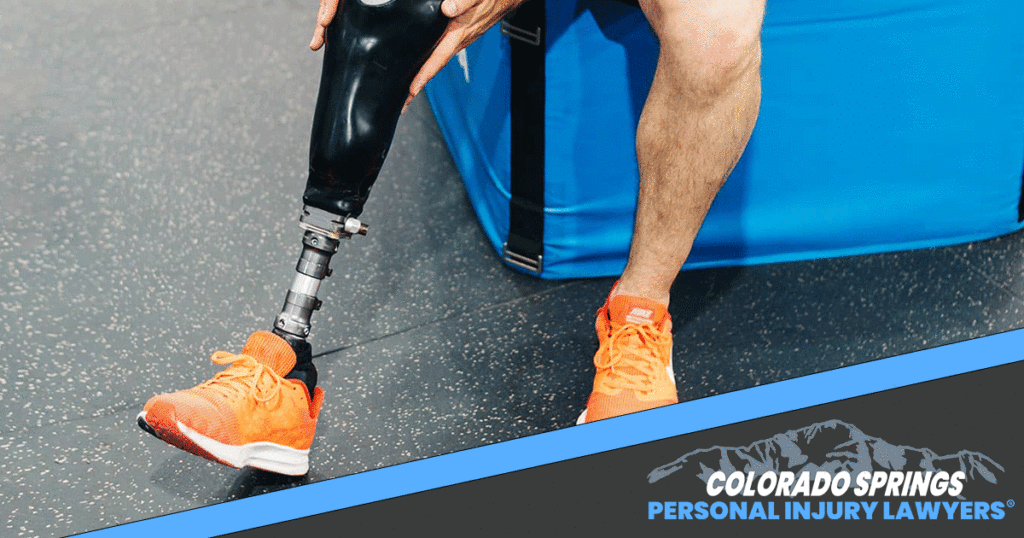The loss of a limb or any body part due to an incident can transform your life completely. Whether it’s a finger, toe, hand, leg, eye, or another crucial body part, amputation influences every facet of your existence—physically, emotionally, and financially. If someone’s carelessness led to your injury, you might be eligible for compensation for medical costs, lost income, emotional distress, and ongoing assistance.
A Colorado Springs amputation attorney can guide you through the legal maze and advocate for the financial aid you deserve. Knowing your rights and legal avenues is vital to ensure that those at fault for your injury face consequences.
Proudly Serving Colorado Springs
Frequent Causes of Amputation Injuries
Amputations commonly arise from severe accidents or unsafe conditions, either occurring instantaneously or necessitating surgical removal due to significant damage. Recognizing the typical causes aids victims in assessing their legal choices. Among the most common causes are:
Vehicle Accidents
- Automobile, motorcycle, and truck accidents often result in grave crush injuries that can lead to amputations.
- High-impact collisions can inflict traumatic injuries that require urgent surgical intervention.
- Pedestrians and cyclists are especially at risk for limb loss due to direct impact from vehicles.
Construction Accidents
- Heavy machinery, faulty equipment, and unsafe working environments often lead to traumatic amputations.
- Workers in factories, construction sites, and agriculture face elevated risks due to perilous work settings.
- Inadequate safety protocols and poor training contribute to avoidable limb loss.
Explosions and Severe Burns
- Industrial explosions, gas leaks, and workplace accidents can lead to extensive tissue damage, resulting in amputations.
- Electrical burns and fires can severely affect limbs, necessitating surgical removal.
Animal Attacks and Severe Infections
- Dog bites and other animal assaults may lead to infections requiring amputation.
- Inadequate wound care and delayed medical attention can result in severe tissue damage.
- Conditions such as gangrene or sepsis can escalate rapidly, necessitating surgical extraction of affected regions.
Types of Amputation Injuries
Amputation injuries differ in cause, severity, and location. Some occur instantly due to trauma, while others necessitate surgical removal. The most prevalent types include:
Traumatic Amputation
These happen when a limb or body part is severed during an accident. High-impact crashes, machinery-related incidents, and explosions are common culprits. Some traumatic amputations permit partial reattachment if immediate medical intervention occurs.
Surgical Amputation
When severe infections, irreparable tissue damage, or extreme fractures arise, physicians may decide to remove the limb to avert further health problems. This form of amputation requires prolonged rehabilitation and adaptation to prosthetics.
Partial vs. Complete Amputation
- Partial Amputation: Some soft tissue remains, allowing for potential reattachment or prosthetic adaptation.
- Complete Amputation: The body part is entirely detached and requires prosthetic solutions for mobility and functionality.
Upper and Lower Limb Amputations
- Upper limb amputations encompass fingers, hands, wrists, forearms, and arms.
- Lower limb amputations include toes, feet, ankles, legs, and hips.
Eye and Facial Amputations
- Trauma, infections, or severe injuries may necessitate the removal of an eye or portions of the face.
- Loss of vision and facial disfigurement can significantly affect an individual’s quality of life.
Genital and Reproductive Organ Amputations
- Severe accidents, infections, or medical mistakes may lead to the loss of testicles and other reproductive organs.
- These injuries carry profound emotional and psychological impacts.
How Amputation Affects Daily Life
The loss of a limb or body part requires significant adjustments to one’s lifestyle, impacting mobility, daily tasks, and emotional health. From learning to use assistive devices to modifying work responsibilities, amputation affects nearly every facet of life. Here are some critical areas influenced:
Mobility and Independence
- Adjustments to prosthetics, wheelchairs, and home alterations are often necessary.
- Numerous amputees depend on assistive technology for routine activities.
Career and Employment Challenges
- Reentering the workforce may prove challenging or impossible in specific job fields.
- Vocational training and job modifications may become necessary.
Daily Activities
- Tasks like cooking, driving, and household chores transform into more daunting endeavors.
- Special accommodations might be necessary for improved accessibility.
The Lasting Consequences of Amputation Injuries
An amputation signifies more than just a physical absence—it introduces lifelong hurdles that modify almost every aspect of daily existence. From ongoing medical issues to emotional challenges and financial strains, the repercussions of limb loss far extend beyond the initial incident.
Physical Challenges
- Phantom limb pain may lead to persistent discomfort.
- Mobility constraints affect everyday life.
- There’s an increased risk of medical complications, including infections and subsequent surgeries.
Emotional and Psychological Effects
- Countless amputees endure depression and anxiety.
- PTSD frequently occurs in individuals who have experienced traumatic events.
- A loss of independence induces emotional turmoil.
Financial Strains
- Medical expenses encompass surgeries, prosthetics, and extended rehabilitation.
- Income loss affects financial security.
- Home and vehicle alterations require substantial investment.
Pursuing Compensation for an Amputation Injury
If you have endured an amputation as a result of someone else’s carelessness, you could be entitled to financial restitution. The physical, emotional, and financial implications of an amputation are immense, but a qualified attorney can assist you in obtaining damages for:
Healthcare Costs
- Expenditures for surgeries, hospitalizations, and prosthetic devices.
- Long-term rehabilitation and physical therapy sessions.
Lost Income and Diminished Earning Ability
- Time away from work for recovery and medical consultations.
- Permanent career modifications due to impairment.
Emotional Distress and Pain
- Compensation for ongoing pain, psychological trauma, and PTSD.
- Loss of life enjoyment due to irreversible disability.
Home and Vehicle Adaptations
- Installation of wheelchair ramps, stairlifts, and accessibility improvements.
- Adaptive driving tools and modified automobiles.
The Legal Procedure for Amputation Injury Cases
Filing a personal injury claim after an amputation can be complicated, but a Colorado Springs amputation injury attorney will lead you through every phase. Grasping the procedure assists you in preparing for what lies ahead and ensures you take the right actions toward financial recovery.
1. Case Evaluation and Consultation
The initial phase is a consultation where your attorney assesses your situation and identifies liability. They will investigate how the incident occurred, who is accountable, and whether negligence was a factor. This involves reviewing medical records, accident reports, surveillance footage, and eyewitness statements to establish a robust basis for your claim. A comprehensive case evaluation guarantees that all liable parties are held responsible.
2. Collecting Evidence
To strengthen your claim, your attorney will collect all essential evidence. This includes medical records showcasing the severity of your amputation, expert testimonies on how the injury affects your life, and financial records evidencing lost earnings and medical expenses. The objective is to illustrate the full magnitude of your damages, ensuring that the compensation request accurately represents your losses. A well-documented case significantly enhances your chances of obtaining fair compensation.
3. Negotiating with Insurance Providers
Insurance companies often attempt to decrease their payments by presenting low settlement offers or questioning the significance of an injury. Your attorney will manage all interactions with the insurers, negotiating assertively to prevent unjust settlements. They will present solid evidence to support your claim’s value, including future medical expenses and long-term disability costs. If the insurance firm refuses to propose a reasonable settlement, your lawyer may prepare for trial.
4. Initiating a Lawsuit and Advancing the Case to Court
If negotiations are unsuccessful, your attorney will take legal measures by filing a lawsuit. This process involves presenting your case to a judge or jury, who will determine the suitable compensation based on the evidence provided. Going to court may appear daunting, but having an experienced Colorado Springs amputation injury lawyer by your side guarantees you have a strong proponent fighting for your best interests.
By following these procedures, your attorney helps you navigate the legal landscape while allowing you to concentrate on healing.
Why Professional Legal Representation is Vital
Managing an amputation injury case without legal assistance can be overwhelming. Dealing with medical care, financial pressures, and emotional strain is challenging enough without also navigating the intricacies of a personal injury claim. A skilled Colorado Springs amputation injury attorney offers vital guidance to safeguard your rights and maximize your restitution.
Securing the Medical Care and Financial Aid You Require
Amputation injuries demand extensive medical attention, from emergency procedures to long-term rehabilitation. A knowledgeable lawyer ensures you receive the treatment you need by connecting you with premier medical professionals, physical therapists, and prosthetic suppliers. They also advocate for compensation that covers hospital stays, surgeries, rehabilitation, and ongoing healthcare costs—helping to alleviate your financial burden.
Managing Legal Documentation and Insurance Negotiations
Personal injury claims involve strict timelines, complicated legal processes, and vast amounts of paperwork. A committed attorney ensures all necessary documentation is submitted appropriately and punctually. They also negotiate assertively with insurance firms, preventing them from presenting unfairly low settlement offers or delaying your compensation.
Confronting Insurance Companies and Responsible Parties
Insurance providers often try to minimize payouts, dispute claims, or shift blame onto the victim. An experienced Colorado Springs amputation injury attorney constructs a robust case using medical evidence, accident reports, and expert testimony to counter these strategies. If necessary, they will take your case to court to advocate for the full compensation you deserve.
Reach Out to a Colorado Springs Amputation Injury Attorney Today
If you or a loved one has experienced an amputation due to an accident, seeking legal assistance is crucial. A Colorado Springs amputation injury attorney will help you obtain the compensation necessary for recovery and long-lasting stability.
Time is limited to file a claim. Get in touch with an attorney today for a free consultation and take the initial step toward justice.

















